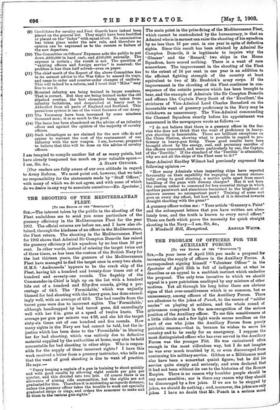THE SHOOTING OF THE MEDITERRANEAN FLEET.
[To THE EDITOR or THE " SPECTATOR.".1 SIR,—The interest taken by the public in the shooting of the Fleet emboldens me to send you some particulars of the gunnery efficiency in the Mediterranean Fleet for the year 1902. The official returns are before me, and I have also ob- tained, through the kindness of an officer in the Mediterranean, the Fleet return. The shooting in the Mediterranean Fleet for 1902 shows that Admiral Sir Compton Domvile has raised the gunnery efficiency of his squadron by no less than 16 per cent. In other words, instead of missing the target twice out of three times, as has been the custom of the British Navy for the last thirteen years, the gunners of the Mediterranean Fleet have managed to find the target once in every two shots. H.M.S. Andromeda' 'appears to be the crack ship of the Fleet, having hit a hundred and twenty-four times out of a hundred and seventy-one rounds. The flagship of the Commander-in-Chief is high up on the list with a hundred hits out of a hundred and fifty-five rounds, giving a per- centage of 64.5. The ` Formidable,' which was unjustly blamed for bad shooting with the heavy guns, has done exceed- ingly well, with an average of 62.8. The bad results from the turret guns were due to incorrect sights. The Formidable,' although handicapped by bad turret guns, did exceedingly well with her 6 in. guns at a speed of twelve knots. The average per gun per minute was 4.38, and she hit the target sixty-six times out of one hundred and five rounds. How many sights in the Navy are bad cannot be told, but the in- justice which has been done to the Formidable' in blaming her for bad shooting, which was entirely due to defective material supplied by the authorities at home, may also be held accountable for bad shooting in other ships. Who is respon- sible for the supply of these incorrect sights ? I have this week received a letter from a gunnery instructor, who tells me that the want of good shooting is due to want of practice. He says :— " Fancy keeping a captain of a gun in training to shoot quickly and with good results by allowing eight rounds per gun per quarter, and this divided into two lots. Of course there is an allowance of aiming rifle ammunition, but the sights are not graduated for this. Therefore it is misleading as regards distance, unless the gunnery officer takes the trouble to work out specially graduated strips or rings, and orders the armourer to make and fit them to the various gun-sights."
The main point in the prize-firing of the Mediterranean Fleet, which cannot be contradicted by the bureaucracy, is that an Admiral who is in earnest can raise the shooting of his squadron by no less than 16 per cent. in one year in spite of defective sights. Since this result has been attained by Admiral Sir Compton Domvile, it is legitimate to inquire why the Gleaner' and the Renard,' two ships in the Home Squadron, have scored nothing. There is a want of care somewhere. The improvement in the shooting of the Fleet to the extent of 16 per cent. in one year is an addition to the efficient fighting strength of the country at least equivalent to two of Mr. Brodrick's army corps. If the improvement in the shooting of the Fleet continues in con- sequence of the outside pressure which has been brought to bear, and the example of Admirals like Sir Compton Domvile and officers like Captain Percy Scott of the ' Excellent,' the strictures of Vice-Admiral Lord Charles Beresford on the lamentable want of gunnery proficiency in the Navy may be withdrawn as unnecessary. The Vice-Admiral commanding the Channel Squadron shortly before his appointment was announced in the newspapers wrote as follows :—
"I do not believe that there is a gunnery officer in the Ser- vice who does not think that the want of proficiency in heavy- gun shooting is lamentable. There are brilliant exceptions on the China Station, showing what is possible in regard to pro- ficiency in heavy-gun firing. These good results have been brought about by the energy, zeal, and pecuniary sacrifice of the officers concerned, and more particularly by one, the Captain of the ' Terrible.' If the standard of the 'Terrible' is attainable, why are not all the ships of the Fleet near to it ?"
Rear-Admiral Eardley Wilmot had previously expressed the following opinion :—
"How many Admirals when inspecting ships have reported favourably on their capability for engaging an enemy success- fully owing to good shooting, a matter quite apart from smart handling of the guns with dummy charges ? Has it not been the custom rather to commend for less essential things in which spotless paintwork and stanchions burnished to the brightest of mirrors assume no unimportant part ? Training of some sort goes on every day afloat, but how much of it is directed towards straight shooting with the guns ? "
A gunnery officer writes me : " Your article Gunnery v. Paint' and the subsequent letters that you have written are abso. lutely true, and the truth is known to every naval officer." These are fact's which prove the necessity for quick straight shooting in the Navy.—I am, Sir, &c.,
2 Windmill Hill, Hampstead. ARNOLD WHIM










































 Previous page
Previous page